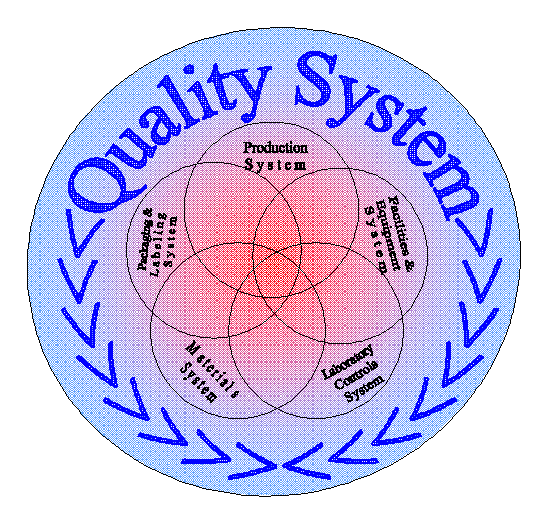Difference between revisions of "User:Shawndouglas/sandbox/sublevel14"
Shawndouglas (talk | contribs) |
Shawndouglas (talk | contribs) |
||
| Line 24: | Line 24: | ||
Quality management is defined by [[ISO 9000]] as a set of "coordinated activities to direct and control an organization with regard to quality.” By extension, those coordinated activities require sufficient "organizational structure, resources, processes and procedures" in order to implement quality management throughout the enterprise, otherwise known as a quality system.<ref name="WHOLQMS11">{{Cite web |last=World Health Organization |date=2011 |title=Laboratory Quality Management System: Handbook |url=http://apps.who.int/iris/bitstream/handle/10665/44665/9789241548274_eng.pdf?sequence=1 |format=PDF |publisher=World Health Organization |isbn=9789241548274}}</ref> | Quality management is defined by [[ISO 9000]] as a set of "coordinated activities to direct and control an organization with regard to quality.” By extension, those coordinated activities require sufficient "organizational structure, resources, processes and procedures" in order to implement quality management throughout the enterprise, otherwise known as a quality system.<ref name="WHOLQMS11">{{Cite web |last=World Health Organization |date=2011 |title=Laboratory Quality Management System: Handbook |url=http://apps.who.int/iris/bitstream/handle/10665/44665/9789241548274_eng.pdf?sequence=1 |format=PDF |publisher=World Health Organization |isbn=9789241548274}}</ref> | ||
As laboratory consultancy Perry Johnson Consulting notes, the difference between the [[ISO/IEC 17025]] standard and [[ISO 9000|ISO 9001:2015]] can be found in comparing the accreditation process: "ISO/IEC 17025:2017 accreditation is recognition of a laboratory’s competence to produce technically valid results, while ISO 9001:2015 registration of a laboratory is limited to QMS conformance."<ref name="PJC17025_22">{{cite web |url=https://www.pjcinc.com/Downloads/ISOIEC17025_exov.pdf |format=PDF |title=ISO/IEC 17025:2017 Testing and Calibration Laboratories: An Executive Overview |author=Perry Johnson Consulting, Inc |date=January 2022 |accessdate=18 December 2022}}</ref> | As laboratory consultancy Perry Johnson Consulting notes, the difference between the [[ISO/IEC 17025]] standard and [[ISO 9000|ISO 9001:2015]] can be found in comparing the accreditation process: "ISO/IEC 17025:2017 accreditation is recognition of a laboratory’s competence to produce technically valid results, while ISO 9001:2015 registration of a laboratory is limited to QMS conformance."<ref name="PJC17025_22">{{cite web |url=https://www.pjcinc.com/Downloads/ISOIEC17025_exov.pdf |format=PDF |title=ISO/IEC 17025:2017 Testing and Calibration Laboratories: An Executive Overview |author=Perry Johnson Consulting, Inc |date=January 2022 |accessdate=18 December 2022}}</ref> They add that ISO/IEC 17025:2017's "technical competency requirements go beyond QMS registration and relate specifically to the qualifications needed with regard to personnel, equipment, facilities, and laboratory methods."<ref name="PJC17025_22" /> | ||
==How supporting quality management in the laboratory improves society== | ==How supporting quality management in the laboratory improves society== | ||
Revision as of 21:31, 18 December 2022
|
|
This is sublevel14 of my sandbox, where I play with features and test MediaWiki code. If you wish to leave a comment for me, please see my discussion page instead. |
Sandbox begins below
Title: What is the importance of ISO/IEC 17025 to society?
Author for citation: Shawn E. Douglas
License for content: Creative Commons Attribution-ShareAlike 4.0 International
Publication date: TBD
Introduction
History of ISO/IEC 17025
Quality management is defined by ISO 9000 as a set of "coordinated activities to direct and control an organization with regard to quality.” By extension, those coordinated activities require sufficient "organizational structure, resources, processes and procedures" in order to implement quality management throughout the enterprise, otherwise known as a quality system.[1]
As laboratory consultancy Perry Johnson Consulting notes, the difference between the ISO/IEC 17025 standard and ISO 9001:2015 can be found in comparing the accreditation process: "ISO/IEC 17025:2017 accreditation is recognition of a laboratory’s competence to produce technically valid results, while ISO 9001:2015 registration of a laboratory is limited to QMS conformance."[2] They add that ISO/IEC 17025:2017's "technical competency requirements go beyond QMS registration and relate specifically to the qualifications needed with regard to personnel, equipment, facilities, and laboratory methods."[2]
How supporting quality management in the laboratory improves society
"Quality management is as applicable for the medical laboratory as it is for manufacturing and industry," states the World Health Organization (WHO) in its 2011 Laboratory Quality Management System: Handbook.[1] While the medical laboratory is better covered by ISO 15189, the WHO's statement highlights that all laboratories can benefit from implementing quality management principles.
Conclusion
References
- ↑ 1.0 1.1 World Health Organization (2011). "Laboratory Quality Management System: Handbook" (PDF). World Health Organization. ISBN 9789241548274. http://apps.who.int/iris/bitstream/handle/10665/44665/9789241548274_eng.pdf?sequence=1.
- ↑ 2.0 2.1 Perry Johnson Consulting, Inc (January 2022). "ISO/IEC 17025:2017 Testing and Calibration Laboratories: An Executive Overview" (PDF). https://www.pjcinc.com/Downloads/ISOIEC17025_exov.pdf. Retrieved 18 December 2022.










